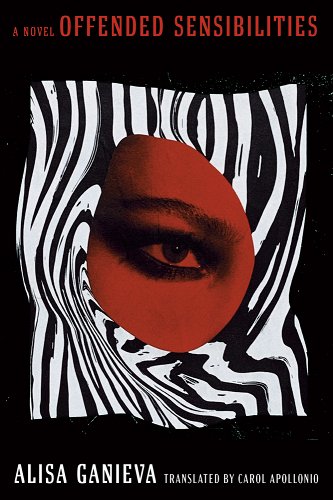[ad_1]
Vladimir Sorokin’s Day of the Oprichnik imagines a near-future dystopia in which a wall separates Russia from the rest of the world and the old Tsarist autocracy has been restored, complete with Ivan the Terrible’s Oprichnina, a sixteenth-century forerunner of the secret police. Sorokin’s novel, which was translated by Jamey Gambrell, envisions a Russian future that is really a return to its medieval past.
Alisa Ganieva’s latest novel, Offended Sensibilities, newly translated by Carol Apollonio, also suggests that contemporary Russian life is a kind of remix of the worst tendencies of Russia’s imperial and Soviet past. Offended Sensibilities poses as a detective novel, but is at its heart a scathing satire of contemporary Russian life.
Set in an unnamed provincial city, the novel opens with the accidental death of the regional minister of economic development. Ganieva traces the effects of the minister’s death as it ripples through different characters, each representing different segments of society—the minister’s wife, a principal at a local school; his mistress, the head of the construction company through which he has diverted considerable government funds; as well as his administrative assistant; the detective investigating the case; a priest; a local artist; a journalist; and a theater director.
Ganieva finds corruption at all levels to be the organizing principle of Russian life. As one character conveniently explains to another:
“If millions of people in the country were to agree all at once not to give or take bribes, not to siphon off funds from the budget, not to try to set up their family and friends, then, yes, in that case, we’d have the rule of law. But so long as even one person is taking their cut, then it’s to everyone else’s benefit to do the same, do you see?”
The same character encourages the late minister’s mistress not to judge herself too harshly: “And speaking from a utilitarian point of view, if things are going well for you, then that means you are right, too. The ends justifies the means.” These statements seem to encapsulate the worldview of most of the characters in the novel; the irony here comes from the fact that both of these observations are voiced by Ilyushenko, an Orthodox priest.
The novel’s title refers to a 2013 law under which felony charges may be brought against those committing public acts that are considered offensive to religious believers. Ilyushenko, known for his “ecumenical” beliefs, later finds himself under investigation for claiming on the Internet that all Christian believers are united by their belief in Christ—a statement of fact that nevertheless threatens to undermine the power of the Russian Orthodox Church. Like all people, Ilyushenko is surprised when the terror apparatus he has served turns against him: “Why this concern for security, this focus on invisible enemies like in the old days? They’re afraid of phantoms, but they’re going around terrorizing actual people, citizens. Me! They’re terrifying me personally.” Another character, near the novel’s end, mentions a “creepy tale” she’s heard about Holodomor, Stalin’s Terror Famine that killed between three and five million Ukrainians in the 1930s. As the “old days” return, the truth is recast as fabrication and invention; lies become the truth.
Offended Sensibilities was first published in 2018, before Russian forces invaded Ukraine last February. Since then, the domestic situation in the Russian Federation has only worsened. As much as the novel is about Russia, it’s impossible not to note similar tendencies at rise on the American right—a prurient religious fundamentalism aimed at curtailing human rights and bodily autonomy, a resurgent nationalism ready to cleanse the country through violence, and a re-writing of the past that embraces disinformation and the concept of “fake news.” Which is to say, that as much as Offended Sensibilities is about Russia, it is also very much about the forces that allow authoritarianism in general to thrive.
Ganieva’s previous novels, The Mountain and the Wall and Bride and Groom, were notable for taking place in Dagestan, a majority Muslim Republic that neighbors Chechnya (All three novels have been lively translated into English by Carol Apollonio). As in Offended Sensibilities, Ganieva didn’t shy away from critiquing a local politics centered on corruption, nationalism, and the increasing power of religious fundamentalists. In those works, Ganieva’s vision felt fresh and compelling because it was the rare insider’s perspective on life in the Caucasus.
If the view of Russian life in Offended Sensibilities feels somewhat less fresh, it is probably because it is so familiar. Ganieva seems to delight in skewering the hypocrisy of the ruling classes. The novel’s strongest points are comic set pieces that underline the absurdities of censorship and the tepidness of art reduced to pure propaganda.
Yet the satirical framework means the characters are symbolic and somewhat flat; they represent ideas that the author manipulates to make a polemical point, and they never quite break free or come to life on their own terms. There is a nice plot twist at the end, but that twist may underline how little the reader ultimately cares about these characters or their fates. Occasionally, works of satire can function as novels of ideas that also engage the reader at an emotional level—works like Swift’s Gulliver’s Travels or Voltaire’s Candide come to mind—in which figures who begin as types progress into characters with whom we might sympathize, but that does not seem to be Ganieva’s intention here.
It’s admittedly difficult to write satire at a time when historical events seem to insist on outdoing themselves. After its invasion of Ukraine, the Russian government made it a criminal act to use the word “war” to refer to the war that it started. How does one satirize a country that has already become a caricature of itself? Ganieva’s portrait of contemporary Russia feels spot-on, less like satire or dystopian invention than a realistic portrayal—but maybe that’s why this comic novel is ultimately so depressing.

FICTION
Offended Sensibilities
By Alisa Ganieva, translated by Carol Apollonio
Deep Vellum Publishing
Published November 8, 2022

[ad_2]
Source link

